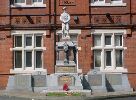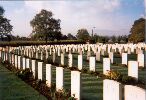
Newton-le-Willows and
Earlestown War Memorial

| OTHER WARS |
 |
Newton-le-Willows andEarlestown War Memorial |
 |
| The
Great War Roll of Honour |
|||||||||||||||||||||||||

Private Wilf Reeves was born in Oldham, the son of John and
Georgina Reeves. He lived with his parents at 1, Birley Street, in Newton-le-Willows.
He had a brother, Sergt. Ernest Reeves of the 2nd Scots Guards, who was wounded
at least twice, the second time in September 1916. Ernest clearly recovered,
as his wedding to Miss Mary Peters is reported in the "Newton and Earlestown
Guardian" issue of 2nd March 1917.
Several letters published in the Guardian issue of April 16th 1915 give details
of the death of Pte. Wilfred Reeves, including one sent home from Pte. Fred
Braddock, who, along with Pte. W. Baskerville, the son of Mr and Mrs Baskerville
of Bridge Street, Earlestown, had "a most marvellous escape":-
"April 9th
Dear Father and Mother,
Just a line to let you know how I am going on. We have been, as you know,
for six days' rest, and we go in the trenches again tonight (Friday). Wednesday
was the day of all days. I never experienced anything like it in my life before.
As you know, our Company officers and servants have been billeted in a farm
house, and the men in the barns and lofts. Well, on Wednesday morning, we
had just finished breakfast, and the servants (myself, W. Reeves and W. Baskerville)
were in the house along with the officers when without any warning at all
a great "Jack Johnson"(1) hit the roof and burst in the kitchen.
God knows how we escaped as the house is in ruins. Smoke, dust, bricks and
beams, slates and great lumps of shell flew all around us. Poor Wilf Reeves
was hit on the head with a piece of shell and killed while W. Baskerville
was badly wounded in the left arm. C. Pill, myself and the Captain crawled
out, dragging poor Wilf with us. We were all badly shaken, but none the worse
thank God. We had no sooner got in the road than another shell burst above
us, but luckily none of us were hit that time. We escaped in just our shirts,
trousers and boots. Pans, kettles, and cooking range where we had just cooked
breakfast were blown to bits. They buried Wilf Reeves by the side of W.
Ball, in Dickebusche Churchyard (2).
Today we are feeling ourselves again. Half that parcel you sent was blown
up, and I found one from Mr W. Bate among the debris. The paper Harry sent
I never found again. I expect the enemy got wind that it was an officers'
billet and, of course, they let us have it. I had the most marvellous escape
anyone could have. When we got out just then a motor car (staff) was passing,
so they took W. Baskerville to the hospital straight away , and I believe
he is doing as well as can be expected.
I have nothing more to say, only that we are quite well and carrying on as
usual so don't be alarmed.
With best love to all. Fred."
Private Reeves was one of the first casualties from Newton-le-Willows, so
was commemorated in a poem published in
the local newspaper.
(1) A type of shell which produced a lot of black smoke, name after a contemporary
negro boxing champion.
(2) Actually, he is buried in Dickebusch
New Military Cemetery, which is a little way from the Church and which
was begun in February 1915 in succession to the Old Military Cemetery near
the Church. It was used until May 1917 by units and Field Ambulances in the
neighbourhood. Dikkebus, the Flemish spelling, is a few kilometres south-west
of Ieper.